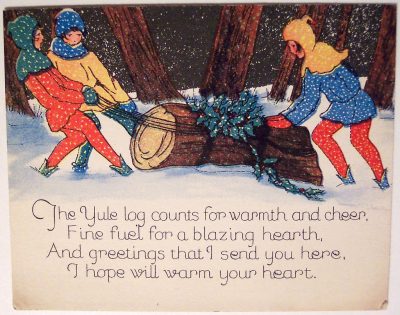05 February 2019
Some Lost Words of the Winter Season
This is a topic that I am more likely to write about on this blog than any of my other blogs, but it first appeared on my Weekends in Paradelle site.
It is about words of the winter season that seem to have gotten lost over the years. An article on the quite wonderful mentalfloss.com website calls a group of words "obsolete Christmas words," but I think most of them are more winter season words. Because they are English (Modern, Middle or Old) and German, they tend to be associated with the Yule or Christmas season.
I probably won't be drinking wassail this month. That is a beverage of hot mulled cider, drunk traditionally as an integral part of wassailing, which was a Medieval Christmastide English drinking ritual intended to ensure a good cider apple harvest the following year. (I may very well down a few hard ciders though, so hopefully that will please the apple gods.) Wassail probably comes from a Germanic phrase meaning “good health" and was a greeting.
One word that is totally new to me comes from Latin. You can say that it looks ninguid outside when the landscape is snow-covered.
You all know that to hibernate means sleeping throughout the entire winter. It is something animals do - not people, though some of us seem to hibernate. But some of you probably do hiemate (which my spellcheck is not happy with) which means to spend winter somewhere.
Actually, searching online for hiernate turned up nothing, so I kind of wonder about the validity of these words. Are they so lost that even Google can't find them? For example, doesn't the term "yule-hole" seem fake or very modern? It supposedly means the hole you need to move your belt to after you’ve eaten a massive meal. And yet, going back to the 1500s, the terms belly-cheer or belly-timber was used for fine food and somewhat gluttonous eating that may occur in winter and around holiday celebrations from Thanksgiving through New Year's and into those stay-at-home days of February too.
If you give a tip when you're at the bar for your drinks, that can be called a pourboire. The word comes from French and literally means "for drink.”
Many of us give or get gift cards and money as a present. To distinguish a thing that is a gift (or present) from one that is money given in lieu of the traditional object gift, the term "present-silver" has been around since the 1500s.
Another word that is brand new to me but old is xenium. It sounds like a new drug or tech company, but it means a gift that is given to a houseguest, or a gift given by a guest to their host.
Do you know nog, a word that comes from ancient English ales but still shows up in words we use during the season, such as eggnog.
While you are celebrating, keep in mind "apolausticism," a long-lost 19th-century word derived from Greek meaning "to enjoy," that describes the total devotion to enjoying yourself.
And after you totally enjoy yourself, a word that looks and sounds just right is crapulence. The OED tells us that this 18th-century word describes “sickness or indisposition resulting from excess in drinking or eating.”
Subscribe to:
Post Comments (Atom)


No comments:
Post a Comment
All comments need to be approved by the admins. Spam will be deleted.